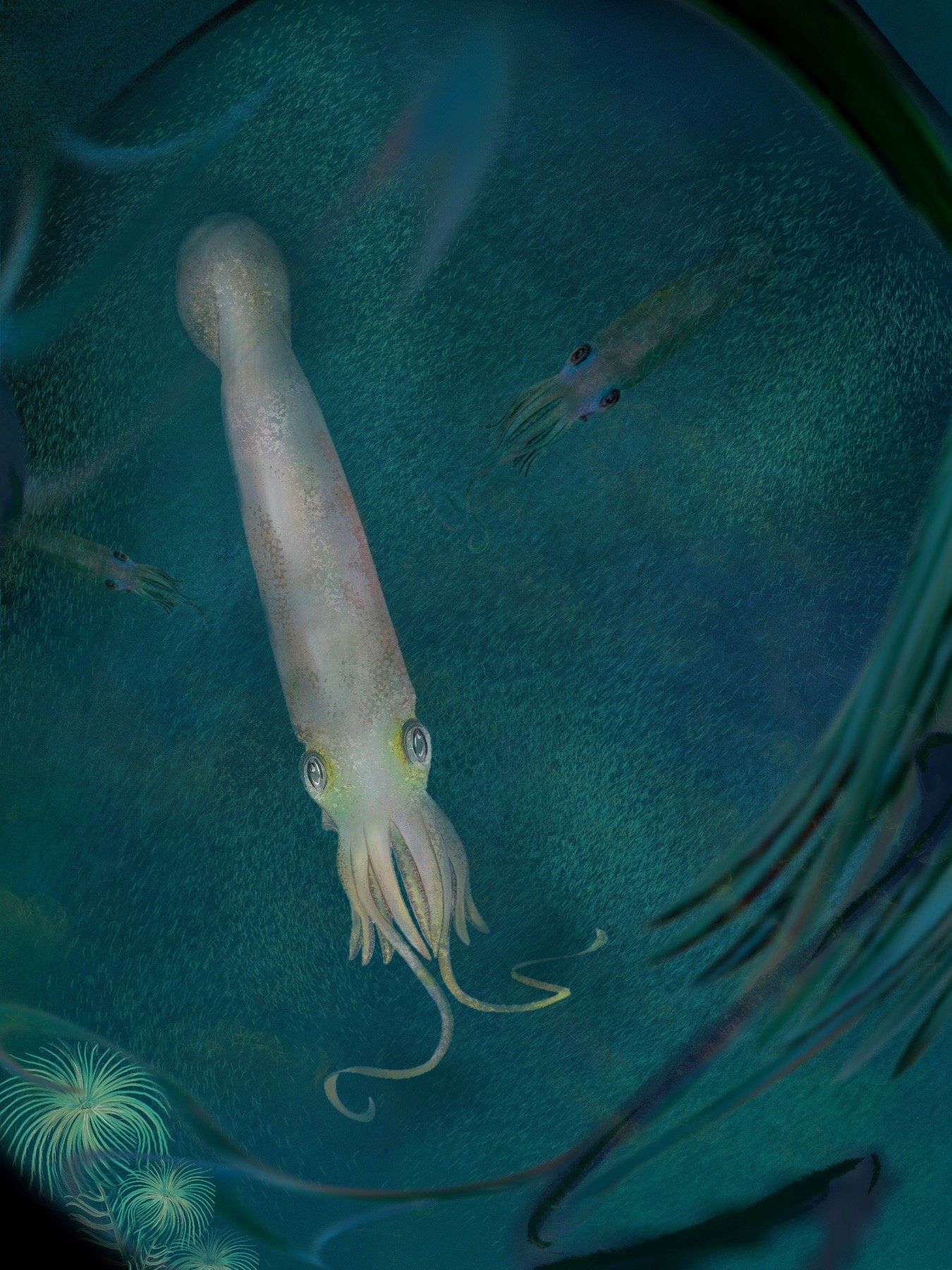Ten-armed squid thought to be 328 million years old named after Joe Biden
Syllipsimopodi bideni was armed with two more limbs than its descendants today and roamed the oceans 328 million years ago

Your support helps us to tell the story
From reproductive rights to climate change to Big Tech, The Independent is on the ground when the story is developing. Whether it's investigating the financials of Elon Musk's pro-Trump PAC or producing our latest documentary, 'The A Word', which shines a light on the American women fighting for reproductive rights, we know how important it is to parse out the facts from the messaging.
At such a critical moment in US history, we need reporters on the ground. Your donation allows us to keep sending journalists to speak to both sides of the story.
The Independent is trusted by Americans across the entire political spectrum. And unlike many other quality news outlets, we choose not to lock Americans out of our reporting and analysis with paywalls. We believe quality journalism should be available to everyone, paid for by those who can afford it.
Your support makes all the difference.A prehistoric squid with ten arms has been named after US President Joe Biden. The creature is the oldest ancestor of cephalopods, which also include octopuses.
Syllipsimopodi bideni was armed with two more limbs than its descendants, and roamed the oceans 328 million years ago.
Additional appendages would have made it a more efficient predator, according to the team at the American Museum of Natural History in New York.
The species was unearthed at the Mississippian Bear Gulch in Montana, one of the best-preserved fossil sites in the world.
It was a primitive vampire squid. They do not suck or drink blood but have dark skin that connects the arms, resembling a cape. The discovery sheds fresh light on evolution, pushing back the age of the group by nearly 82 million years.
Dr Christopher Whalen, the lead author of a paper on the squid, said: “This is the first and only known vampyropod to possess ten functional appendages.” The paper was submitted for publication in the journal Nature Communications around the time of the 79-year-old US president’s inauguration.
Dr Whalen said: “I wanted to somehow acknowledge the moment in a way that was more positive and forward-looking.
“I was encouraged by the plans President Biden put forward to counter anthropogenic climate change, and his general sentiment that politicians should listen to scientists.”
Vampyropods are the ancestors of vampire squid and octopuses. Their origins are unclear. Modern descendants have eight arms and two big eyes, enabling them to survive in pitch-black waters near the bottom of the ocean.
Octopuses and squid can reach 45 and 60 feet long respectively, and weigh half a ton. S. bideni was less than five inches long, showing they started out small before growing significantly.
Its remains are exceptionally important, as the soft-bodied nature of cephalopods mean they rarely fossilise.
Co-author of Nature Comunnications study, Professor Neil Landman, said: “Syllipsimopodi may have filled a niche more similar to modern squids, a mid-level aquatic predator.
“It is not inconceivable it might have used its sucker-laden arms to pry small ammonoids out of their shells or ventured more inshore to prey on brachiopods, bivalves or other shelled marine animals.”
S. bideni was dug up in the 1980s and donated to the Royal Ontario Museum in Canada, where it has resided ever since without previously being described. After scanning the specimen, Dr Whalen and Prof Landman realised it was a completely new genus and the oldest cephalopod on record.
It corroborates previous arguments that their common ancestor had ten arms. Dr Whalen said: “The arm count is one of the defining characteristics separating the 10-armed squid and cuttlefish line from the eight-armed octopus and vampire squid line.
“We have long understood that octopuses achieve the eight-arm count through elimination of the two filaments of vampire squid, and that these filaments are vestigial arms.
“However, all previously reported fossil vampyropods preserving the appendages only have 8 arms. This fossil is arguably the first confirmation of the idea all cephalopods ancestrally possessed ten arms.”
Two of S. bideni’s arms appear to have been elongated relative to the other eight. Its torpedo-shaped body is reminiscent of today’s squids.
The genus name is Greek for ‘prehensile foot’ because it is the oldest known cephalopod to develop suckers. They allowed the arms – modifications of the molluscan foot – to grasp prey and other objects.
“The findings present a revised and more detailed analysis of vampyropod evolution than previously possible”, said Dr Whalen.
Joe Biden was inaugurated on 20 January last year. He is the 46th president of the United States. A host of strange animals have been named after his predecessors, including the tiny moth Neopalpa donaldtrumpi. The insect’s yellow-and-white crown bears a striking resemblance to Donald J. Trump’s distinctive coiffure.
Baracktrema obamai is a species of flatworm that is meant to honour Barack Obama.
The parasitic wasp Heterospilus washingtoni is named after George Washington, a tiny shrew Crocidura roosevelti hails Theodore Roosevelt and Jimmy Carter gave his name to the bluegrass darter Etheostoma jimmycarter.
Others include the beaded darter Etheostoma clinton after Bill Clinton and the wasp Heterospilus reagani after Ronald Reagan.
Join our commenting forum
Join thought-provoking conversations, follow other Independent readers and see their replies
Comments